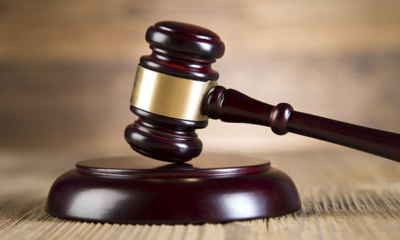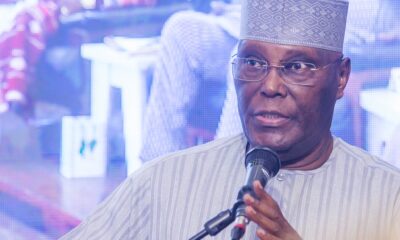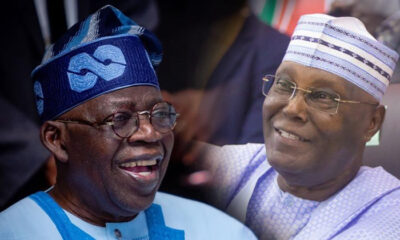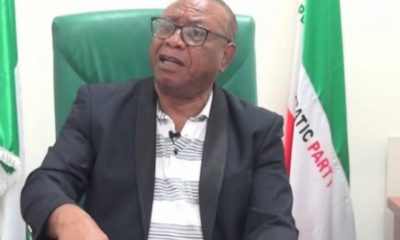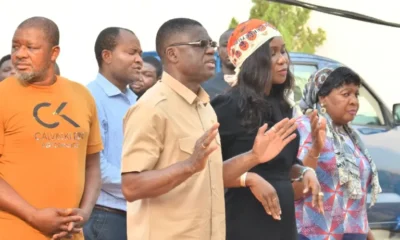Opinion
Another Look at Atiku’s Prayers at the Tribunal
By Gabriel Uduafi

Perhaps if I have direct contact with the candidate of the Peoples Democratic Party in the just concluded Presidential election, former Vice President Atiku Abubakar, I would have dropped this at his door step as a candid advice from a Nigerian lawyer, who finds it difficult to stomach irregularities in election petitions. In my almost two decades of being a lawyer, out of which I have spent over 10 years, involving in various election petitions at various levels, I have come to realize that most petitions fail on technical grounds and not as a result of the position of the law. As a result of this, it is easy for me, like some other experienced lawyers to predict what would likely be the outcome of petitions the moment they are filed before the tribunals.
Since the first day I set my eyes on the details of the over 100 pages petition filed by Alhaji Atiku, I have noticed some flaws, which I think pointing them out would help the petitioner and his team of lawyers as they move towards upturning the result of the election. One, the case presented appears too terse and the pleading too dry for a presidential election. In election petition, a petitioner doesn’t challenge in the blues or in the air but has to be specific. By this I mean there should be specific allegation that in unit A or B, there are these irregularities or the other. Even at that, if a petitioner points out flaws in some units in Ekiti and Ebonyi States for instance, the discovery in those two states are not enough to cancel an election that took place in the 36 states of the federation, including the Federal Capital Territory.
I was privy to the petition filed by Prof. Olusola Eleka, the candidate of the PDP in the July 2018 gubernatorial election in Ekiti which produced the current Governor, Kayode Fayemi and in substance, any legal expert that knows his onions will know that it carries more weight than Atiku’s. Eleka’s petition, which is over 2000 pages, detailed what was believed to be abnormalities in the entire 16 local governments of Ekiti state. In Atiku’s case, we are talking of a presidential election that involved over 180 million people in population and is captured in just 100 pages. In this, how will the petitioner be able to bring out evidences that can appeal to discerning minds of the tribunal panel?
Coming to the issue of qualification of qualification of President Muhammadu Buhari, raised in the petition, which expectedly has generated so much furore in the public domain, I think those who included it were either ignorant of the law or inserted to please their clients because it is has no basis in Law. One, anything that has to do with qualification suppose to be a pre-election issue and it must be raised at least 14 days after the Independent National Electoral Commission has published the lists of party candidates. This is in accordance with the amendment of the Nigerian Law and in addition, the Supreme Court positions in Taraba, Akwa Ibom, Zamfara and other areas that issue of non qualification cannot be raised by an outsider who is not a party member.
Besides, if at all, this will be raised, it has to be raised by a member or members of the candidate’s party and not an outsider as in the case of Alhaji Atiku of the PDP. He has no business with that (locus standi) because that complaint can only come from a member of the All Progressives Congress (APC). It is party’s affair and not the business of members of other parties. For emphasis, it must be noted that what concerns an election petition tribunal is the election disputes and not pre-election imbalance.
Finally, while I will not advise Alhaji Atiku to discontinue his determination to follow his case to the logical conclusion, for public good I want to prepare his mind and those of his followers, as already done by respected legal practitioners, including Human rights lawyer, Femi Falana (SAN), who has rightly predicted that Atiku Abubakar will face “insurmountable legal obstacles” at the Presidential Election Petition’s Tribunal. “Regrettably, however, the failure of the PDP and APC-led Federal Government to reform the electoral process has created insurmountable legal obstacles for election petitioners,” Falana had said in a statement issued shortly after the election. He added that “the frustration of election petitioners has been compounded by several judicial authorities”, with some decisions holding that “an election cannot be questioned on grounds of corrupt practices. The senior lawyer went further by pointing out that a petitioner is required to prove that there is substantial non-compliance and that the non-compliance has substantially affected the results of the election.
However, my position may be different. Since the outcome of the 1979 election petition, which was ruled in favour of Alhaji Shehu Sagari, the winner of the election, I have come to realize that it is against public policy to nullify a presidential election. In the cycle of legal practitioners, it is being debated till date that the panel that sat on Chief Obafemi Awolowo petition against Shagari knew that the 12 was not the 2/3 of 19, but it was allowed to stand in the national interest. Knowing well that nullifying presidential result could lead to coup or breaking down of law and order, tribunals are always circumspect in taking decisions. Again, while I’m not saying this to talk Atiku out of his decision, I’m using my open appeal to prepare his mind against unfavourable outcome of his case and the need for him to calm the nerves of his followers in the interest of all.
Uduafi is a Lagos based legal practitioner
And For More Nigerian News Visit GWG.NG



